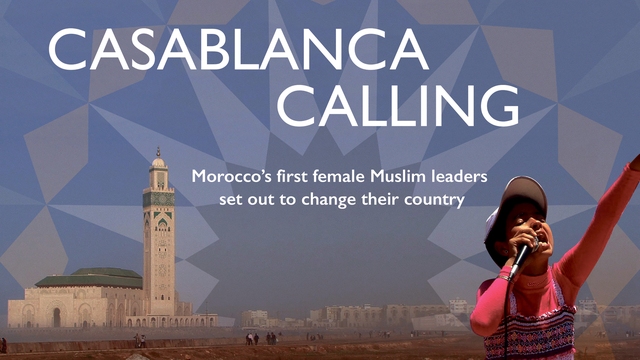Casablanca Calling
The female Muslim preachers on a mission to change their nation
 In Morocco, an unprecedented experiment is taking place. For the first time ever in a Muslim country, women are being allowed to become preachers. The morchidat, as they are known, might just be the antidote to extremism, and they are teaching a more tolerant form of Islam that protects the rights of women. Part teachers, part counsellors, they go from town to country, schools to prisons, sowing the seeds of change.
In Morocco, an unprecedented experiment is taking place. For the first time ever in a Muslim country, women are being allowed to become preachers. The morchidat, as they are known, might just be the antidote to extremism, and they are teaching a more tolerant form of Islam that protects the rights of women. Part teachers, part counsellors, they go from town to country, schools to prisons, sowing the seeds of change.
"She knows everything that's going on in our lives, any problems at home. She's like our mum, sister, teacher, everything!" At the girls' dormitory where morchidat Bouchra acts as counsellor, she is a popular figure, having earned the absolute trust of the girls through her frequent visits. She is indispensable in helping them navigate the problems that come with life away from home, not least the tension with their families that arises from their burgeoning independence; until recently in Morocco, exposing girls to the outside world was considered a sure path to their corruption. In Bouchra, the girls have a confidante with whom to share their frustrations; one who is committed to changing the older generation's archaic modes of thought. "Morocco and other Muslim countries have been living in a long period of ignorance and stagnation" says Hannane. A Morchidat like Bouchra, she believes that women preachers can bring much-needed change to Moroccan society starting with women's rights, which they consider a fundamental tenet of Islam. Their mission to disseminate this message as widely as possible takes them to villages where religion is the pretext under which women are forced to work in the fields. Rachida lives in one such village, where the men do not work. A visit from a Morchidat provides the opportunity to voice her frustration: "Why must women suffer from childhood to old age? I can't believe Islam says we should live like this." Can the newly-trained Morchidat change old ways of thinking? Revealing the unbreakable optimism of these women, Casablanca Calling documents their struggle at the forefront of change in modern-day Morocco.
 Winner - Women's Rights in Africa Award, One World Media Awards 2015
Winner - Women's Rights in Africa Award, One World Media Awards 2015
 Official Selection - DOK Leipzig 2014
Official Selection - DOK Leipzig 2014
 Official Selection - East End Film Festival 2014
Official Selection - East End Film Festival 2014
 Official Selection - DOXA 2014
LEARN MORE.
Official Selection - DOXA 2014
LEARN MORE.
WATCH MORE.
JOIN THE DISCUSSION.







